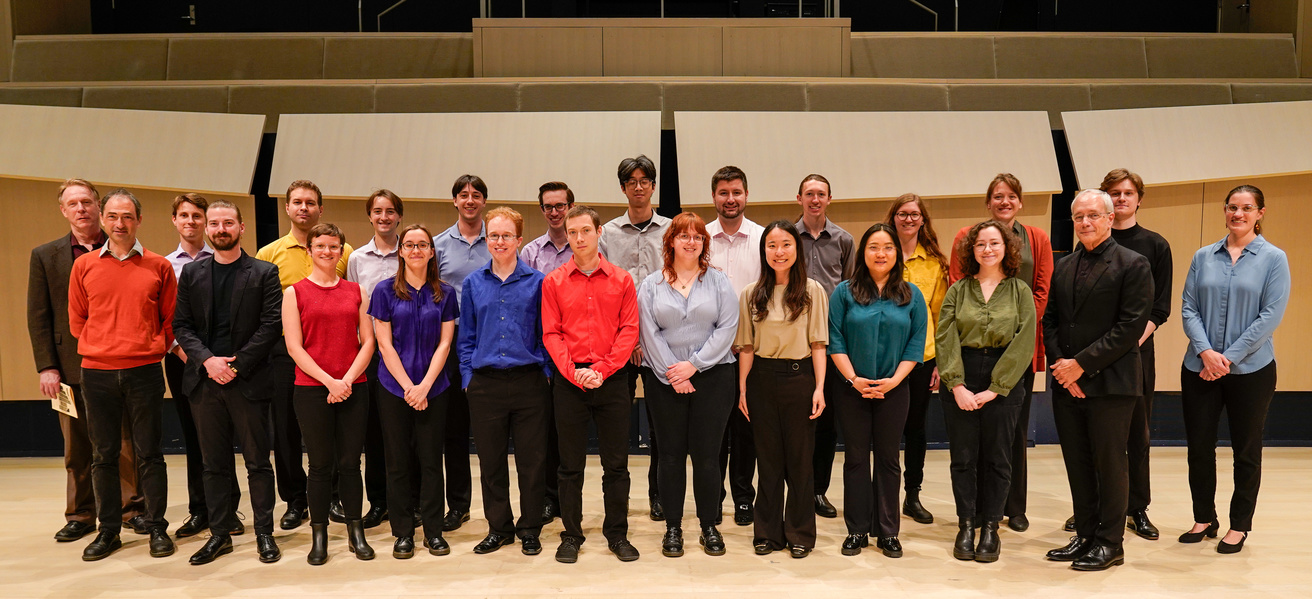CNM Ensemble Concert IV
Sunday, April 20, 2025 at 7:30p in the Concert Hall
Program
Nigritella nigra, for clarinet and string quartet (1998) | Jean-François CHARLES (b. 1974) |
| Sayyod Mirzomurodov, clarinet Yestyn Griffith violin I Michael Klyce, violin II Kylie Little, viola Hanna Rumora, violoncello |
Flow, for flute, percussion and piano (2020)I. Drips & Drops | David DZUBAY (b. 1964) |
| Joshua Stine, flute McKenna Blenk, percussion Neil Krzeski, piano |
intermission
Just Talking, for chamber orchestra (2024) | John BERNERS (b. 1961) |
Alu, for sinfonietta (2025) *premiere | Gregory Rowland EVANS (b. 1995) |
Center for New Music Musicians
| Berners - Just Talking Emily Ho, flute David Cyzak*, oboe Lea Banks, clarinet Sayyod Mirzomurodov, bass clarinet Lucas Wiese, alto saxophone Erik J Lopez Reyes, bassoon Erica Ohmann, horn Jake Fekete, trumpet Xiaoyu Liu, trombone Evan Tanner and Will Walters, percussion Neil Krzeski, piano Sarah Arnone, harp Yestyn Griffith and Michael Klyce, violins Rebecca Vieker, viola Hanna Rumora, violoncello Xiaowen Tang, double bass David Gompper, conductor |
| Evans - Alu Emily Ho, flute David Cyzak*, oboe Sayyod Mirzomurodov, bass clarinet Erik J Lopez Reyes, bassoon Erica Ohmann, horn Jake Fekete, trumpet Xiaoyu Liu, trombone Matt Sleep, tuba McKenna Blenk and Evan Tanner, percussion Neil Krzeski, piano Yestyn Griffith, violin I Michael Klyce, violin II Rebecca Vieker, viola Hanna Rumora, violoncello Xiaowen Tang, double bass David Gompper, conductor |
Program Notes
Jean-François Charles (b. 1974) Nigritella nigra is composition is a musical portrait of the black vanilla orchid, a flower you can meet when you hike in the Alps. The piece opens with a musical rendering of the flower’s vanilla scent. This microtonal concentration of energy turns into more extravert gestures in the second part, reflecting the orchid’s strong character. 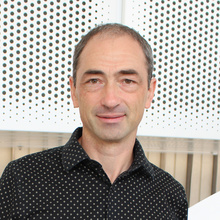
Composer and Associate Professor at the University of Iowa, Jean-François Charles is also a clarinetist, an electronic musician, and a Max Certified Trainer. Creating at the crossroads of music and technology, he has performed dozens of concerts with his Spectral DJ instrument. His 2024 album Tenebrae was reviewed as "Five stars: A fascinating excursion into Charles’ mind, superbly engineered." in Fanfare Magazine. His polystylistic Missa brevis Abbaye de Thélème was released on the New Flore Music label in 2023, starring Anika Kildegaard. Jean-François Charles directed the associated award-winning Agnus Dei music video. This same year, he co-composed with Nicolas Sidoroff a full soundtrack to the 1923 Hunchback of Notre Dame movie starring Lon Chaney. Other highlights include the award-winning album Jamshid Jam - a duet with setar virtuoso Ramin Roshandel, and the opera Grant Wood in Paris, commissioned by the Cedar Rapids Opera Theatre (premiered in 2019). |
David Dzubay (b. 1964) Composed for and dedicated to my good friend and long-time professional colleague, flautist Alejandro Escuer, FLOW is a concerto for flute and orchestra. One can imagine many things “flowing”: air, creating the flute’s sound; water traveling from here to there around this whole planet – giving us all life and a shared elemental experience; people, moving to and fro; and of course, music, especially music passing ideas back and forth among musicians or taking one or more motives on a journey across a piece of music lasting some 20 minutes, as in FLOW. Each of these examples of flow also involve transformation, in a process that might be circular, or perhaps never-ending. 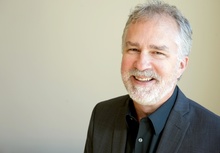
David Dzubay has received commissions from Meet the Composer, Chamber Music America, the National Endowment for the Arts, the US-Mexico Fund for Culture, and the Fromm and Barlow foundations, among others. Honors include Guggenheim, Bogliasco, MacDowell, Yaddo, Copland House and Djerassi fellowships, and a 2011 Arts and Letters Award from the American Academy of Arts and Letters. His music has been performed by orchestras, ensembles and soloists in the U.S., Europe, Canada, Mexico, and Asia, and is published by Pro Nova Music and recorded on the Sony, Bridge, Centaur, Innova, Naxos, Crystal, Klavier, Gia, and First Edition labels. Currently professor of music and director of the New Music Ensemble at the Indiana University Jacobs School of Music in Bloomington, Dzubay also spent three years as Composer-Consultant to the Minnesota Orchestra and one as Composer-in-Residence with the Green Bay Symphony. Since 2011, he has taught composition for three weeks each summer at the Brevard Music Center. |
John Berners (b. 1961) Just Talking begins with the percussion fidgeting and clearing the orchestra's throat--ahem--and soon the violins begin to speak. The bass clarinet and trombone respond and soon most of the orchestra is talking among themselves. This piece is conversational; almost every phrase played is a solo. Outbursts, bickering and other modes of chatter form waves that rise and fall musically over the five minutes' duration. The piece is meant, on the one hand, to have humor--I love those performers who do wonderful speech mimicking with their instruments. But, by getting loose and having each instrument show an independent and rebellious character, it is also a response to the traditional, incredibly unified mode of orchestral playing. Further, simple conversation; talking and listening; being open, is something we need more of. Obviously most of the world's problems could be solved with the right kind of conversation. So--here is a moment of music about talking. 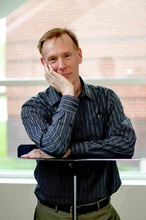
Called "captivating" by the New York Times and "vivid" and "cheeky" by the Indianapolis Star, the music and words of John Berners are also "delightfully surprising and quirky," and "near madness" according to Indianapolis Nuvo Weekly. Berners's music has been performed by the Detroit Symphony, Virginia Symphony, Kiev Philharmonic, Indianapolis Chamber Orchestra, and featured at festivals like Tanglewood, June in Buffalo, Composers Now, Music X, Walla Walla Chamber Music Festival, and the Missouri New Music Festival. |
Gregory Rowland Evans (b. 1995) Alu - The title word "Alu" is a somewhat gnomic term found on a variety of runestones. While a clear definition of the term is not agreed upon, it is used in the context of benediction in the closing of rune texts and perhaps derives from "ale." In this composition, some inspiration was taken from the encryption techniques used to hide deeper meanings within the poetic, ceremonial inscriptions on runestones. In addition to the association of runes with the practice of encoding, there remains an association of runes with the crudeness of the technology of antiquity. This association, combined with the notion of monoliths as unwieldy objects, led to a musical vision of the chamber orchestra as a fairly uniform body articulating swarming, mass textures. The music takes a step back from many of the modern advances in experimental or virtuosic performing technique, preferring a crude and jagged approach to both form and material. 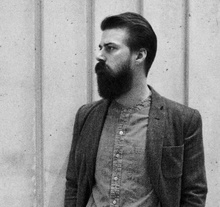
Gregory Rowland Evans is a composer and cellist whose music explores narrativity, memory, and abstract structuralism. He holds degrees from the University of Cincinnati College-Conservatory of Music (BM), the Frost School of Music (MM), and a Ph.D. in composition from the University of Iowa. His mentors include Jean-François Charles, Sivan Cohen Elias, and David Gompper, with additional study under Trevor Bača, Ann Cleare, Michael Finnissy, Hèctor Parra, and Chaya Czernowin. |
